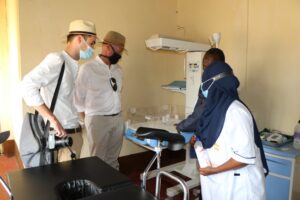By Nrt
The burden of maternal mortality among communities in Biliqo Bulesa Community Conservancy and its environs continues to be the greatest challenge, especially with limited access to a lifesaving facility for safe deliveries.

Isiolo Deputy Governor Dr. Abdi Issa (black jacket) and the team from Hungary during a visit to the facility
The rates of deaths of mothers and infants remain high in Isiolo, with statistics from the United Nations Population Fund (UNFPA) indicating that 790 mothers are dying out of 100,000 deliveries owing to long distances between health facilities, the inadequacy of health facilities, a lack of skilled personnel, low education, and cultural factors such as Female Genital Mutilation (FGM) and early marriages.
Similarly, Isiolo is among six regions contributing to more than half of maternal mortality cases recorded in Kenya.
But there is a new hope to avert the high cases of maternal and child mortality cases in Isiolo, especially in Merti sub-county with the opening of a new dispensary which has an equipped maternity wing. The health facility is set to be launched in the coming months.
With support from the Danish International Development Agency (Danida) and Hungary Helps, through the Northern Rangelands Trust (NRT), communities in Biliqo Bulesa Conservancy and its surroundings can now access adequate healthcare. The good news is, those expectant mothers also have a chance to deliver safely and attend all ante-natal care visits during pregnancy, reducing the chances of maternal deaths.
Before the construction, the nearest maternal and child health services, and reliable operating facilities were located in Isiolo town, approximately 210 kilometres away – a six-hour journey by bus. The nearest sub-county
medical facility is in Merti, about 42 kilometres away which only provides laboratory and diagnostics, with no operating theatre services. Sometimes, there is no reliable public transport in the area to ferry women to hospitals during emergency situations.
“Before, expectant mothers from Biliqo and other neighbouring areas were being ferried to Isiolo town to access maternal services; we’ve had cases where women have lost their babies on their way or shortly after arriving at the hospital. Now that we have this facility, we’re grateful that it will help save our mothers and the newborns,” says Golicha Guyo Karayu, former Biliqo Bulesa Conservancy chairperson.
Prior to this support, Biliqo dispensary was a semi-permanent structure with a lack of access to laboratory services and reliable medical supplies stock. The maternity unit was a community-built structure which was not fit for purpose and patients were being attended to with no privacy.
Access to safe and clean water supply to the facility and the community was also a challenge. To ensure a regular supply of clean water to the health facility, the Swedish Government through the IMARA programme supported the connection of water to the dispensary with 20,000 litres of water being pumped to the facility daily.
Currently, the facility has a maternity block, a new clinic, renovated old facility which is now being used to house staff and serve as a store, an incinerator for safe waste disposal and a fence, all supported by Danida.
The staff accommodation, laboratory, storage facility, placenta pit and equipping of the maternity wing was funded with the generous support of Hungary Helps, with the county government of Isiolo chipping in to support the dispensary with personnel and medical supplies.
“We expect to have an increase in hospital deliveries since more patients from neighbouring villages are visiting the dispensary of late to access primary healthcare,” says Madina Kalo, Nurse in Charge, Biliqo dispensary.
Since it was opened in March 2020, at least 52 safe deliveries have been successfully carried out in the new maternity, one step further in reducing maternal deaths in the area.
The 10-bed capacity maternity also serves as a ‘temporary shelter’ for prenatal and post-natal for expectant mothers who come from hard reach areas as they await their delivery time.
Biliqo Bulesa Community Conservancy’s programmes and operations are supported by the United States Agency for International Development (USAID), Taronga Zoo Sydney and the Agence Française de Développement (AFD).




